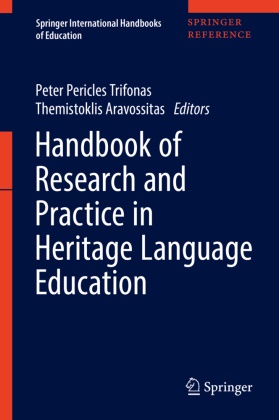Mehr lesen
This volume covers the multidimensional and international field of Heritage Language Education, including concepts, practices, and the correlation between culture and language from the perspectives of pedagogy and research. Heritage Language Learning is a new dimension in both the linguistic and pedagogic sciences, and is linked to processes of identity negotiation and cultural inheritance. It is a distinct pedagogical and curricular domain that is not exhausted within the domains of bilingualism and second or foreign language education. A heritage language is not a second or foreign language, it is the vehicle whereby cultural memory is transmitted over time, across distances, communities, and generations. Heritage languages play an important role ensuring the balance between coherence and pluralism in contemporary societies that have come to realize that diversity is an advantage for social, cultural, and economic reasons.
The volume includes topics like First Nation indigenous languages, languages in diaspora, immigrant and minority languages, and contributions from North, central and South America, Europe, Africa, Asia, and Australia. It addresses the social, linguistic, and cultural issues in educational contexts in a new way by taking up questions of globalization, difference, community, identity, democracy, ethics, politics, technology, language rights and cultural policies through the evolving field of Heritage Language Education.
Inhaltsverzeichnis
Heritage and Language: Cultural Diversity and Education.- Why Should Formal Linguistic Approaches to Heritage Language Acquisition Be Linked to Heritage Language Pedagogies?.- Plurilingualism: Vision, Conceptualization, and Practices.- Developing Metacognition and Interculturality in Heritage Language Learners.- Heritage Language Speakers in the University Classroom, Doing Research.- Heritage Language Learners in Mixed University Classes: Language Skills, Attitudes, and Implications for Curriculum Development.- The Multiplicity Framework: Potential Applications for Heritage Language Education and Pedagogy.- Encouraging the Use and Activation of Heritage Languages in the Broader Educational System.- Culturally Responsive Pedagogy: Modeling Teachers' Professional Learning to Advance Plurilingualism.- Professional Development of Heritage Language Instructors: Profiles, Needs, and Course Evaluation.- Language Teachers' Ideologies in a Complementary Greek School in Montreal: Heteroglossia and Teaching.- A Language Contact Perspective on Heritage Languages in the Classroom.- Linguistic and Cultural Diversity in Language Education Through Plurilingualism: Linking the Theory into Practice.- Heritage Language Development in Interlingual Families
Über den Autor / die Autorin
Peter Pericles Trifonas is Professor at the Ontario Institute for Studies in Education/University of Toronto. His areas of interest include converging literacies, ethics, philosophy of education, cultural studies, and technology. Among his books are Deconstructing the Machine (with Jacques Derrida); International Handbook of Semiotics; CounterTexts: Reading Culture; Revolutionary Pedagogies: Cultural Politics, Instituting Education, and the Discourse of Theory; The Ethics of Writing: Derrida, Deconstruction, and Pedagogy; Institutions, Education, and the Right to Philosophy (with Jacques Derrida); Roland Barthes and the Empire of Signs; Umberto Eco & Football; Pedagogies of Difference.
Themistoklis Aravossitas teaches Modern Greek language and culture at the Centre for European, Russian and Eurasian Studies of the Munk School of Global Affairs, at the University of Toronto and at the Department of Languages, Literatures and Linguistics of York University. He holds a bachelor of education from the University of Athens, an M.A. and a Ph.D. from the Department of Curriculum Teaching and Learning of the Ontario Institute for Studies in Education, University of Toronto. He specializes in teacher education, heritage languages and knowledge media design. Having served as a school teacher in Europe and Canada, he is currently investigating the status of heritage language programs and community languages in Ontario. As a SSHRC-Canada post-doctoral research fellow at the University of the Aegean, Themistoklis is designing a portal and online learning tools for heritage language learners. His research interests include teacher education, language, culture and pedagogy, multilingual education and knowledge media. He has co-edited the book Rethinking Heritage Language Education.
Zusammenfassung
This volume covers the multidimensional and international field of Heritage Language Education, including concepts, practices, and the correlation between culture and language from the perspectives of pedagogy and research. Heritage Language Learning is a new dimension in both the linguistic and pedagogic sciences, and is linked to processes of identity negotiation and cultural inheritance. It is a distinct pedagogical and curricular domain that is not exhausted within the domains of bilingualism and second or foreign language education. A heritage language is not a second or foreign language, it is the vehicle whereby cultural memory is transmitted over time, across distances, communities, and generations. Heritage languages play an important role ensuring the balance between coherence and pluralism in contemporary societies that have come to realize that diversity is an advantage for social, cultural, and economic reasons.
The volume includes topics like First Nation indigenous languages, languages in diaspora, immigrant and minority languages, and contributions from North, central and South America, Europe, Africa, Asia, and Australia. It addresses the social, linguistic, and cultural issues in educational contexts in a new way by taking up questions of globalization, difference, community, identity, democracy, ethics, politics, technology, language rights and cultural policies through the evolving field of Heritage Language Education.

